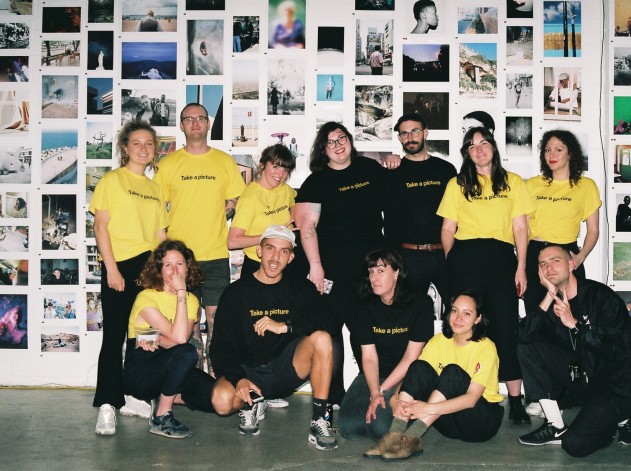The DIY photographers taking the gallery world by storm
- Text by Biju Belinky

In 2012, after moving from London to Melbourne, Joe Miranda got a bit bored. Used to the hectic pace of London life, the abundance of space and time proved itself to be stagnating. But it wasn’t for long. Armed with an idea, Joe took those precious resources and started carving out a new space, separate from institutions, where independent photographers felt welcome and stimulated – something he felt was heavily lacking in the Australian city. Just like that, the Independent Photography Festival (I.P.F) was born.
Five years later, the festival has been called to four major cities in three different continents, featuring carefully curated shows from both emerging and established talent. But the beating heart of I.P.F is the Photo Prize – a salon-style competition that receives hundreds of entries during each instalment from professionals, beginners and hobbyists alike. The project seeks to shift the focus of the photography world and allow for more open, inclusive conversation.

“Institutions have sort of privatised spaces and practices, living in a bit of a circle jerk between universities, national galleries and local spaces,” writes Joe over email. “Most supposedly independent spaces end up mimicking the same approach because that’s the standard. It’s easier to tweak than it is to change.”
But mimicking and walking the beaten path is the exact opposite of what I.P.F is about. Echoing the same DIY spirit that launched the project in the first place, Joe believes that although it is important to read up on technique, photographers who follow the traditional education route shouldn’t be considered better than those who are self-taught.
“You could argue that the institutional echo chamber of formal art education is the reason we see such same-same product everywhere, and everything feels saturated, whilst still feeling underpopulated and dissatisfying,” says Joe.
“The act of looking outside of and ignoring mainstream, institutional artists and organisations is quite difficult, but it feels like a relatively easily achieved way to take up space and centre the bodies and voices that are too often shown through the lenses of outsiders in a fetishising way, and that should be listened to more, and given more space.”
Joe started photographing at the age of 15 with a Canon AE-1 Program and, after a stint of working professionally in London and Melbourne, he now considers himself to be a hobbyist.
The London edition of I.P.F runs May 4-28, 2017, with a roster of incredible shows – from California’s Deadbeat Club, featuring Ed and Deanna Templeton, to British photographer Christopher Nunn‘s stunning work in Ukraine.
And submissions are now open for this year’s Photo Prize. When I ask Joe what he looks for in an image that encapsulates the spirit of I.P.F, it’s a clear answer.
“Good is subjective, original is relative. We try to award the prizes through honestly and openly reacting to the work in the exhibition,” he says. “It’s not easy and I definitely don’t think it’s definitive, but since we have the competition element as part of this exhibition, it’s a part of it. Personally, I just want the community to put their money where their mouth is and get involved, join in, remove ego and the need for a single approach and support community-based moves.”
Submissions for the I.P.F Photo Prize 2017 are open until 24 April 2017.
Enjoyed this article? Like Huck on Facebook or follow us on Twitter.
Latest on Huck

In the ’60s and ’70s, Greenwich Village was the musical heart of New York
Talkin’ Greenwich Village — Author David Browne’s new book takes readers into the neighbourhood’s creative heyday, where a generation of artists and poets including Bob Dylan, Billie Holliday and Dave Van Ronk cut their teeth.
Written by: Cyna Mirzai

How Labour Activism changed the landscape of post-war USA
American Job — A new exhibition revisits over 70 years of working class solidarity and struggle, its radical legacy, and the central role of photography throughout.
Written by: Miss Rosen

Analogue Appreciation: Emma-Jean Thackray
Weirdo — In an ever more digital, online world, we ask our favourite artists about their most cherished pieces of physical culture. Today, multi-instrumentalist and Brownswood affiliate Emma-Jean Thackray.
Written by: Emma-Jean Thackray

Meet the shop cats of Hong Kong’s Sheung Wan district
Feline good — Traditionally adopted to keep away rats from expensive produce, the feline guardians have become part of the central neighbourhood’s fabric. Erica’s online series captures the local celebrities.
Written by: Isaac Muk

How trans rights activism and sex workers’ solidarity emerged in the ’70s and ’80s
Shoulder to Shoulder — In this extract from writer Jake Hall’s new book, which deep dives into the history of queer activism and coalition, they explore how anti-TERF and anti-SWERF campaigning developed from the same cloth.
Written by: Jake Hall

A behind the scenes look at the atomic wedgie community
Stretched out — Benjamin Fredrickson’s new project and photobook ‘Wedgies’ queers a time-old bullying act by exploring its erotic, extreme potential.
Written by: Isaac Muk

